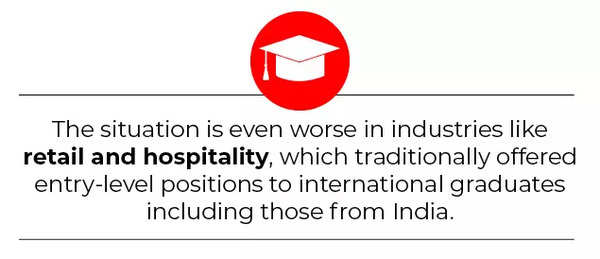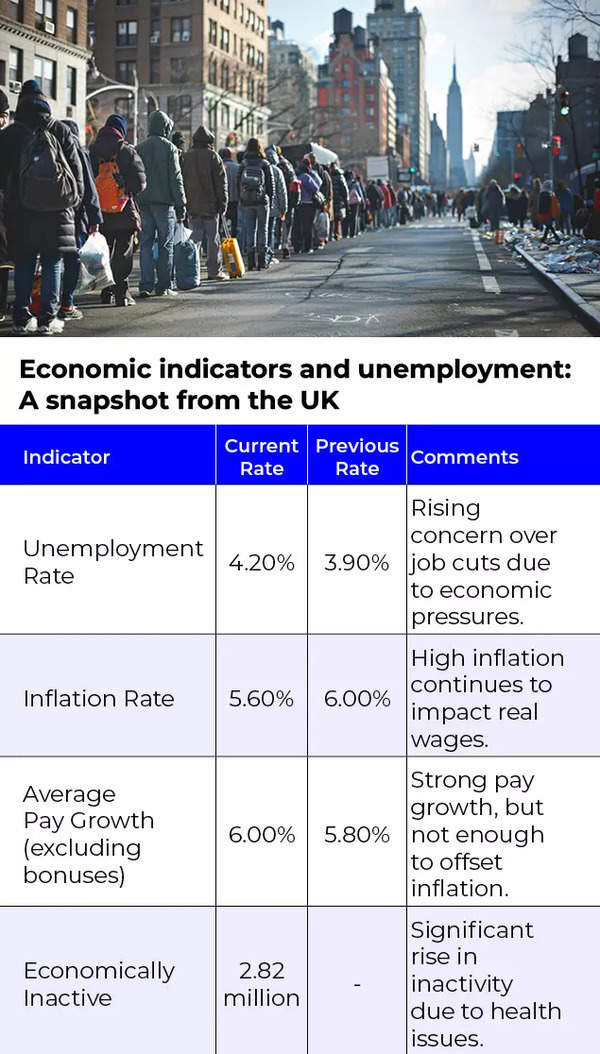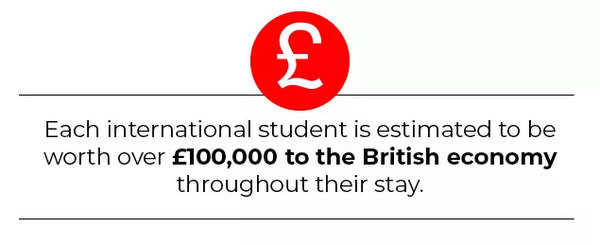
In a poignant post on LinkedIn that resonated with many, Swetha Kothandan, an Indian student in the UK, offered to work for free, desperate to gain employment and extend her stay in the country. Kothandan, who graduates from the University of Leicester in 2022 with a master’s degree in mechanical engineering, said his struggles are reflective of a wider issue of declining employment opportunities affecting many UK international students, including those from India.
As of the latest statistics, India remains one of the largest sources of international students in the UK. According to Universities UK, there are 126,535 indian student Enrollments in UK higher education institutions in 2021-22 make India the second largest contributor after China. UK government figures show that each international student is expected to contribute more than £100,000 to the UK economy during their stay.

Despite their large numbers, international students, including Indian graduates, still struggle to find jobs. The big question now is: Britain is economic slowdown Is it difficult for Indian students to find jobs?
UK job losses: Shocking statistics
As of October 2023, the UK is grappling with a challenging economic situation, characterized by high inflation and rising unemployment. According to the Office for National Statistics (ONS), the unemployment rate rose to 4.2% in February 2024, compared with 3.9% a few months ago. Data from the Confederation of British Industry (CBI) shows that British companies are slashing recruitment, with nearly 70% of companies reducing recruitment activities due to financial constraints. For international students, this contraction means fewer graduate-level jobs on the market. As a result, access to visa-sponsored work is becoming increasingly difficult for many graduates, particularly from non-EU countries such as India.

Despite increased wage growth, many industries continue to face stagnation, especially high-skilled occupations. ONS data shows that average wages in the hotel industry rose sharply by 8.4%, while the IT and professional industries lagged behind, rising by only 4% and 3% respectively. The disparity highlights the challenges faced by graduates in technical fields while employers are reluctant to hire new workers.
How is the economic slowdown in the UK affecting Indian students?
For Indian students in the UK, the recession has added fuel to an already blazing job market. Many of these graduates have invested hundreds of thousands of dollars in their education in hopes of finding positions in booming industries such as IT, healthcare, engineering and finance. But with the recession, these once-promising industries have scaled back hiring, limiting opportunities for recent graduates.
The situation is even worse in sectors such as retail and hospitality, which have traditionally provided entry-level jobs for international graduates, including those from India.

According to media reports, these industries not only provide fewer employment opportunities, but also slash wages. While the cost of living has soared, especially in cities like London, salaries have failed to keep pace with inflation. This creates a nightmare scenario where students struggle to make ends meet while coping with an increasingly expensive lifestyle?
To make matters worse, many employers are using the recession as an excuse to tighten their belts, blaming economic uncertainty and inflation for their reluctance to recruit. In an environment where businesses are cutting costs, it’s no surprise that local candidates are being prioritized over international talent. Wouldn’t employers want to go through the hassle of sponsorship and visa applications when they can hire people without these hassles?
The economic slowdown has also left the entire industry in a state of instability. Chronic illness and strikes have depleted the workforce, adding to pressure on already limited employment opportunities. According to the Office for National Statistics, around 850,000 working-age people in the UK were classed as economically inactive at the start of 2024, including those on long-term sick leave. This demographic shift places a huge burden on an already struggling job market, making it harder for new graduates — especially those without local work experience or professional networks — to break into.
For Indian and other international students, a combination of diminished opportunities, increased competition and a persistently slow economy is creating insurmountable barriers to success. After years of studying abroad and investing large sums of money, many people find that they cannot justify the cost of their education and emotional costs in a shrinking job market. Faced with few options, they are forced to make painful choices: return to their hometowns, accept jobs that pay a fraction of their value, be offered free work, or accept positions for which they do not meet their qualifications. This situation defeats the entire purpose of investing in their education and makes them question whether it is worth it.
morality unpaid work: a heated debate
Kothandan has sent her applications to more than 300 positions but has received only a handful of constructive responses. Her plea – “My postgraduate visa expires in 3 months… this LinkedIn post is my last chance for a long-term future in the UK” – embodies what many international students find themselves in similar predicaments. Sense of urgency. The current job market seems unfavorable, with companies hesitant to sponsor visas amid economic uncertainty.
Cotandam’s offer to work for free for a month speaks volumes about the desperation in a tight job market. Many have expressed concern about such practices, arguing that they undermine the value of technology jobs and set a troubling precedent for future job seekers. Some users on LinkedIn advised her against working for free, saying it would be detrimental to her qualifications and the value of her degree.
A call to action: Supporting international students in a volatile economy
Cotandam’s plight also raises serious questions about the support system available to international students in the UK. With many facing similar challenges, governments and education institutions must reassess their role in promoting graduate employment and visa sponsorship.
As the UK economy begins to show signs of recovery, with a recent report from the Office for National Statistics showing that GDP grew by 0.6% from January to March 2024, policymakers must address these systemic issues. Supporting graduates to pursue meaningful employment should be a priority, not only to retain talent but also to ensure the UK remains an attractive destination for future international students.
In light of these challenges, the conversation around the value of work, the impact of unpaid internships, and the broader economic climate must continue to evolve, ensuring that the aspirations of students like Cotandam are met, rather than despairing.
(With input from Saswati Sarkar)







